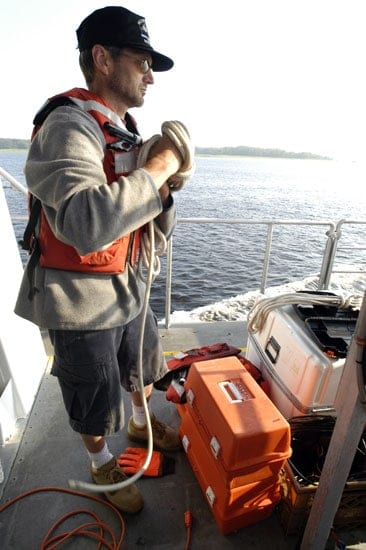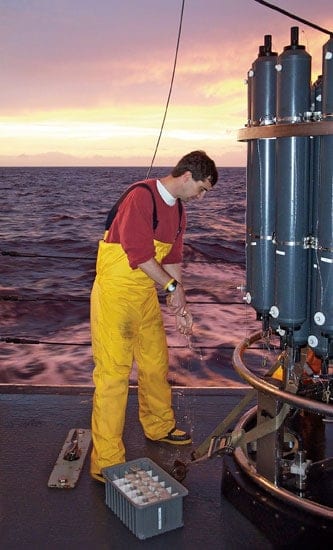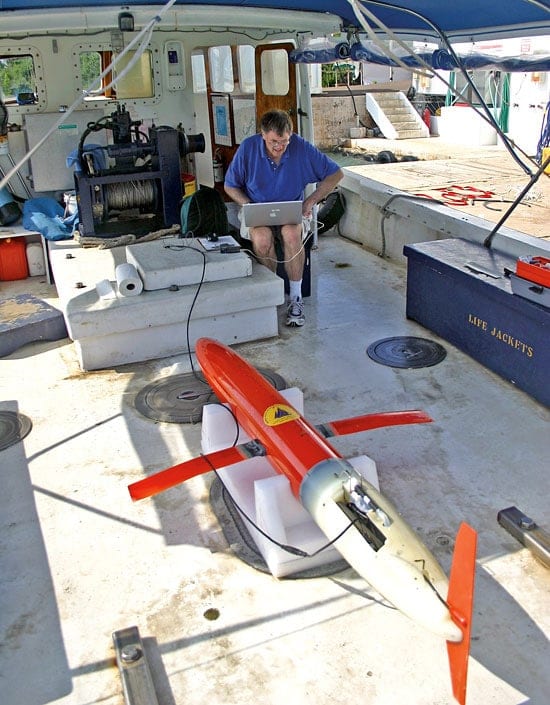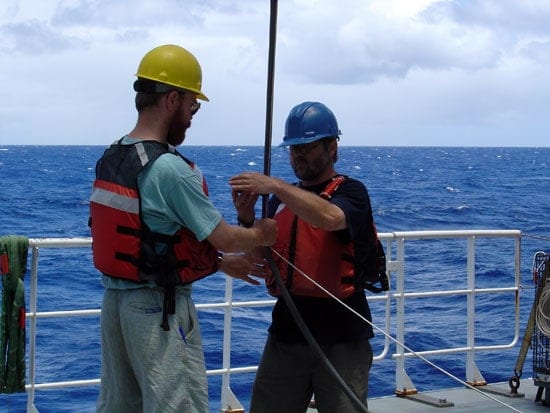Four WHOI Researchers Recognized for Contributions to Science and Engineering
November 9, 2006
Four researchers have been recognized by the Woods Hole Oceanographic Institution (WHOI) for their contributions to ocean sciences research and engineering. All will receive funding provided by the endowed awards to support their research over periods of three to five years. The awards are effective January 1, 2007.
Three of the researchers have been named recipients of endowed senior scientist chairs that provide financial support for five years, allowing the recipient the freedom to pursue a variety of career interests. One investigator received a technical staff award that provides support over three years.
Dr. Wayne Rockwell “Rocky” Geyer, recipient of the Mary Sears Chair for Excellence in Oceanography, received a bachelor’s degree in geology from Dartmouth College in 1977 and M.S. and Ph.D. degrees in physical oceanography from the University of Washington in 1981 and 1985, respectively. He joined the WHOI staff in 1985 as a postdoctoral scholar in the Applied Ocean Physics and Engineering Department, spent another year as a postdoctoral investigator, and was appointed assistant scientist in 1987. Geyer was promoted to associate scientist in 1991 and to senior scientist in 2001.
Rocky Geyer served as director of the Institution’s Rinehart Coastal Research Center from 1996 to 2001 and was chair of the Applied Ocean Physics and Engineering Department from 2001 to 2005. Geyer’s research has centered on estuarine and coastal transport processes, sediment transport, and numerical modeling of estuaries and river plumes. He has conducted projects in the Hudson River in New York, looking at sediment contamination from PCBs from electrical companies on the river, and the Eel River in California, where flooding has carried large amounts of sediment into coastal areas. More recently he has conducted experiments in the Merrimack River in Massachusetts, studying the interaction between fresh and salt water and the ability of a river to disperse material into the Gulf of Maine.
The Sears chair is named for Dr. Mary Sears, one of the first staff members of the Institution and a guiding force in its development. A biologist, she also served as clerk of the Institution’s corporation for many years and was a major presence in uniting the international oceanographic community. She passed away in 1997 at the age of 92.
Dr. Scott Doney, recipient of the W. Van Alan Clark, Sr. Chair for Excellence in Oceanography, is a senior scientist in the Marine Chemistry and Geochemistry Department. He received a bachelor’s degree in chemistry from Revelle College at the University of California, San Diego in 1986 and a Ph.D. in chemical oceanography in 1991 from the MIT/WHOI Joint Graduate Program. He returned to WHOI in 2002 following eleven years in the Advanced Study Program and Climate and Global Dynamics Division at the National Center for Atmospheric Research (NCAR) in Boulder, CO.
Doney was a Fellow of the Institution’s Ocean and Climate Change Institute from 2003 to 2005 and serves as co-chair of the Biogeochemistry Working Group of the Community Climate System Model. He was chair and editor of Ocean Carbon and Climate Change: An Implementation Strategy for U.S. Ocean Carbon Research, released in 2004. His research interests include the global carbon cycle, marine biogeochemistry and ecosystem dynamics, large-scale ocean circulation and tracers, and air-sea gas exchange.
Dr. W. Brechner Owens, recipient of the W. Van Alan Clark, Jr. Chair for Excellence in Oceanography, is a senior scientist in the Physical Oceanography Department. He received a B.S. degree in chemical engineering from the University of Michigan in 1968, an M.S. degree in chemical engineering from the University of Colorado in 1972, and a Ph.D. in physical oceanography from The Johns Hopkins University in 1976.
Breck Owens joined the WHOI staff in 1975 as a postdoctoral investigator and was appointed an assistant scientist in 1978. He was promoted to associate scientist in 1982 and to senior scientist in 1992. His research interests include the general circulation and eddy variability in the world’s oceans, ocean-atmosphere coupling dynamics, the use of models to interpret observations and the development of float technology and autonomous vehicles for ocean monitoring. He is one of the co-developers of the Spray glider, the first autonomous underwater vehicle to cross the Gulf Stream, and is one of the principal investigators for the U.S. Argo float program for climate change studies.
The W. Van Alan Clark Chairs were established in 1986 and are named for the late W. Van Alan Clark, Sr., and W. Van Alan Clark, Jr., longtime friends and supporters of the Institution. W, Van Alan Clark, Sr., was a businessman and philanthropist who served as board chairman of Avon Products, Inc. He was one of the first Woods Hole Oceanographic Institution Associates and served the Institution as a Corporation Member and Honorary Trustee. W. Van Alan Clark, Jr., was President and Chairman of Sippican Corp. of Marion, MA, and a former professor and associate dean at the Massachusetts Institute of Technology. He served the Institution as a Corporation Member, Trustee, Associate and was chairman or a member of several Institution committees. Both he and his father were well-known sailors, with W. van Alan Clark, Sr., involved in international cruising and racing.
Steven J. Manganini, a research specialist in the Geology and Geophysics Department, is the recipient of the Allyn Vine Senior Technical Award. He received a bachelor’s degree in biology from Nasson College in 1974. He joined the WHOI staff in 1977 and has participated in numerous research cruises around the world. Steve has spent much of his career studying how particles travel from surface waters into the deep sea, and has developed instrumentation and analytical methods to further characterize particle and sediment materials.
The Vine award is named for former WHOI physical oceanographer and visionary Allyn Vine, for whom the submersible Alvin is named. Vine was widely recognized as a leading proponent for manned exploration of the deep sea, and championed construction of other tools for the national community, often producing new techniques and unusual equipment. He passed away in 1993 at age 79.
It is awarded for a three-year period and is presented to a member of the Institution’s technical staff who “has distinguished himself or herself through extraordinary accomplishments in engineering, instrument development, information systems, or oceanography, and who has demonstrated a commitment to mentorship and partnership with junior technical staff members.” Nominations are solicited from the scientific and technical staff, with selection based on the individual’s record of excellence.
The endowed senior scientists chairs are each awarded for a five-year period to tenured members of the Institution’s scientific staff who have “distinguished themselves through extraordinary scientific research and education.” Nominations are solicited from the scientific staff, with selection based on the individual’s record of scientific excellence. The Institution’s Director and Executive Committee of the Board of Trustees approve the awards.
Woods Hole Oceanographic Institution (WHOI) is a private, independent marine research and engineering and higher education organization located in Falmouth, MA. Its primary mission is to understand the oceans and their interaction with the Earth as a whole, and to communicate a basic understanding of the ocean’s role in the changing global environment. Established in 1930 on a recommendation from the National Academy of Sciences, the Institution is organized into five departments, interdisciplinary institutes and a marine policy center, and conducts a joint graduate education program with the Massachusetts Institute of Technology.




